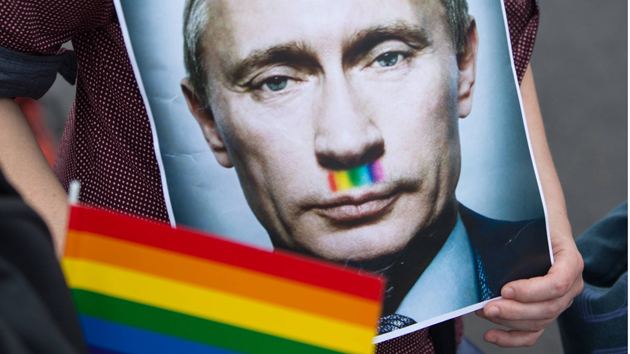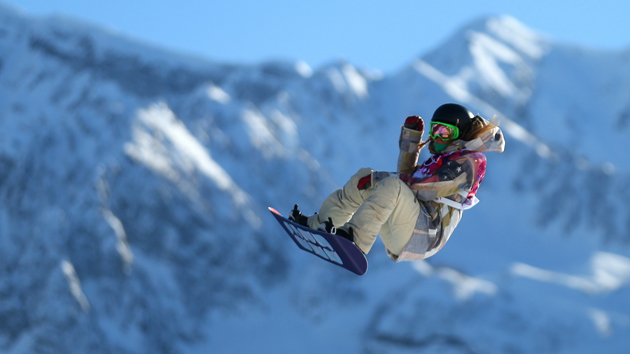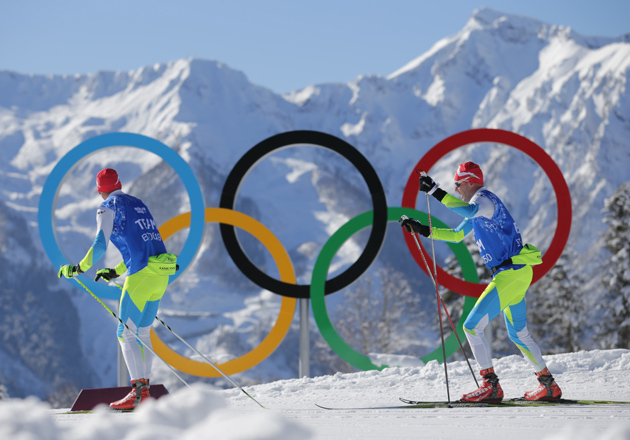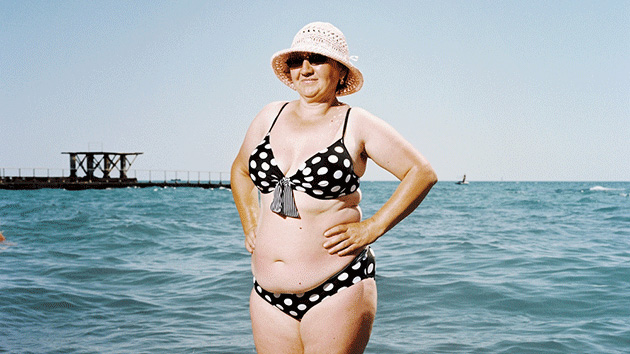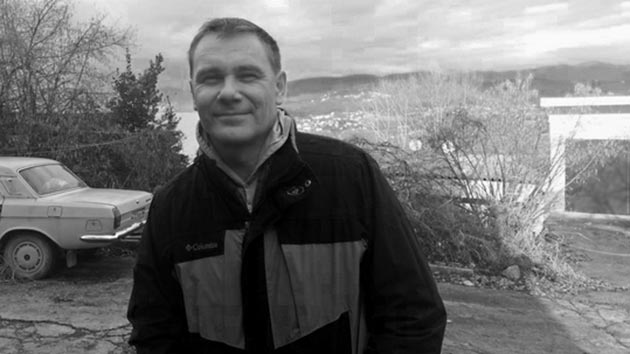
Yevgeniy Vitishko in Tuapse in 2012, before his imprisonmentEnvironmental Watch on Northern Caucasus
My first stop at Sadovaya Prison Colony No. 2 in central Russia is the visitors’ intake center. I’ve traveled for 14 hours on an overnight train that reeked of fetid socks to see my imprisoned friend, environmental activist Yevgeny Vitishko. By my noon arrival at the colony, I’m already running late, and reams of red tape await before I’ll be able to see him.
I’ve come to these cold mud flats 440 miles south of Moscow for the first interview Vitishko has given in the seven months since February 12, 2014, the day he was sent away in the midst of the Sochi Winter Olympics.
In the years leading up to the event, Vitishko had emerged as one of the competition’s fiercest critics. Along with his little-known organization, the Environmental Watch on North Caucasus (EWNC), Vitishko protested the ecological destruction and crony Kremlin corruption that fed the $51 billion games, the most expensive in history. Now, a year after the closing ceremonies, his dire predictions of environmental havoc have come true—and Vitishko sits in prison. He has been described as the only prisoner of conscience associated with the Sochi Olympics.
Vitishko and I immediately hit it off when we first met in January 2014, in his hometown of Tuapse, 75 miles northwest of Sochi on the Black Sea. A Krasnodar court had recently sentenced him to three years in the Sadovaya penal colony on charges that he’d painted an environmental message on a fence. He remained free on the condition he not leave Tuapse until a long-shot February 12 appeal was set to be heard at a regional court.
We met up at my hotel, one of the town’s neglected Soviet-era spas. The 41-year-old geologist’s white turtleneck and tan made him look like he’s just stepped off a yacht. I hopped in his car and he sped down the narrow hill roads to his favorite coffee joint.
His looming prison sentence gave him, Vitishko said, a “nothing to lose” freedom with his words. With the opening ceremony just 13 days away, Vitishko sipped his cup of Turkish blend and rattled off the Games’ disastrous effects. The Myzmta River, once Sochi’s main water source, was poisoned by toxic construction waste. Wells had dried up, thanks to illegal quarries and dump sites; the weight of newly paved roads, trafficked nearly 24/7 for years by heavy dump trucks and digging machinery, ruined the region’s aquifers. The traffic inundated villagers with dust, affecting residents’ health, livestock, and farms. Sochi’s seaside stadiums decimated the Imereti lowlands, turning a major migratory stopover for endangered birds into a strip of Olympic venues and construction debris. But the longest lasting damage, Vitishko warned, would come from the way the government rewrote environmental law to accommodate Olympic construction.
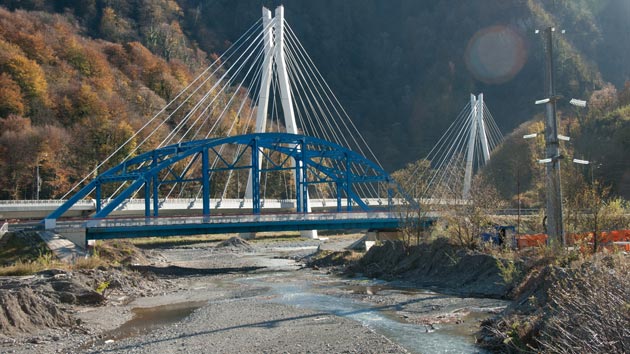
After seven years of gumshoeing, Vitishko was preparing to publish a report detailing such findings, cowritten with his friend Suren Gazaryan, once the Olympics kicked into full swing. (Full disclosure: I helped translate EWNC’s report into English.)
“I’m not afraid to go to jail for what I’ve said, and I probably will,” Vitishko told me that day. “If it draws the world’s attention to how the Olympics have destroyed the Black Sea area, I’ll sit in a cell. It’ll just be part of my journey.”
Before I can see Vitishko in the prison colony, I have to clear my documents with the prison functionaries. I knock on a portal grayed with grease that I can only assume has come from decades of pounding fists. When the small window creaks open, Olga, a blond administrator who looks about 30, politely introduces herself. She moves with the mechanized efficiency of a flight attendant in her smart, pressed blue uniform. Foreigners aren’t technically restricted from entering, but my blue American passport causes a stir. She says the deputy warden, Colonel Gavrilov, will have to decide if I get in.
Olga gives me plenty to do to fill the nervous hours waiting for Gavrilov’s verdict. I’ve hauled a 65-pound satchel of supplies for Vitishko. Olga says I must describe in eye-glazing detail every item I’ve brought and its purpose on a sheaf of blank newsprint paper.
Mostly, I’ve brought clothing. When Vitishko was arrested, it was 65 degrees Fahrenheit along the subtropical Black Sea coast. He had to wear the same shorts and windbreaker for two months after being shipped 600 miles north to the colony and its blustery Russian winter. Warden Gavrilov denied parcels to Vitishko for another month, according to Anna Mitrenko of the Public Monitoring Commission, a prisoners’ rights group. It was not until Vitishko had been in custody for four months that the organization managed to get small packages to him.
The more items I catalog, the more absurd I feel describing their obvious purpose: “Socks—for use in keeping the prisoner’s feet warm in outdoor and cool indoor conditions (10 pairs);” “Wool pants—to clothe the prisoner’s lower extremities in cold weather (2 pairs);” “Pencils—for writing sentences on blank paper (10 pieces).” Item for item, I spend two hours accounting for what’s in the bag. My hand cramps into a useless claw. When I finish, I knock on the portal, wait, knock again, and wait. Olga finally opens it and takes my stack of papers. Gavrilov still hasn’t made up his mind. She tells me to wait some more.
I mill about, reading the cautionary tales tacked up by prison staff: An inmate received a mobile phone disguised as a cigarette pack from his visiting brother. The prisoner spent a week in solitary and his brother was fined 3,000 rubles (about $45). There’s a portrait of Colonel Gavrilov. Sporting his epaulets, he looks like a man who enjoys his work. I step outside to the muddy smoking area and blow blue smoke rings through the barbed wire canopy into the fading light of the November dusk. In the distance, silhouetted prisoners wrangle in the season’s last anemic cabbage harvest.
Vitishko’s tangled legal troubles began in 2011, when he led a 12-person protest opposing the fence surrounding Regional Governor Alexander Tkachev’s summer home in the Black Sea National Forest. The fence, which still stands, entirely cuts off public access to the beach.
“We’d been out to the fence before many times,” he told me. “This demonstration wasn’t anything out of the ordinary, and was small and peaceful.”
During the demonstration, someone painted “This is our forest” across the metal barrier. Ten of the 12 EWNC activists who were there, including Vitishko and Gazaryan, identified two young tag-along women as the graffiti artists. None of the 10 has been able to locate either of the women. (Vitishko did acknowledge bending part of the fence to film the construction and tree stumps hidden behind it.)
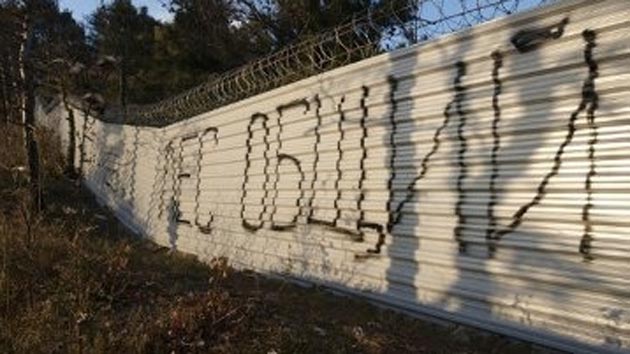
I tried to find them myself: Police took down their names when they broke up the protest, so I coaxed a desk officer to give me their address and cell numbers. Neighbors told me the women had vacated their shabby apartment. When I called their cellphones, a recording said they’d been disconnected. The desk officer told me the cops hadn’t tried to find the women. Vitishko, he said, was their man.
In June 2012, Vitishko and Gazaryan were sentenced to three years in prison on charges related to what is locally known as “the fence incident.” But the court agreed to suspend the sentences, instead imposing a two-year probationary period. Gazarayan fled Russia later that year. In 2013, Vitishko was found to have broken the court’s terms. His sentence was reinstated, but he remained free pending an appeal.
Vitishko was then arrested on a purportedly unrelated charge in early February 2014, just four days before the Games opened: Police said they’d received an anonymous tip that he’d been heard swearing in public. Vitishko was denied a request to phone his lawyer and jailed immediately for 15 days by a town judge who relied solely on the anonymous account. Court records show the source never turned up to testify; Vitishko’s Sochi-based attorney, Alexander Popkov, says the no-show suggests there was no anonymous call to begin with. Nevertheless, Russian law allows judges to dole out so-called administrative sentences at their discretion, without the participation of defense lawyers or witnesses. “It’s an excellent intimidation tactic,” says Popkov.
The 15-day detention meant Vitishko would not be able to speak to the world’s media as they descended on Sochi. It also guaranteed Vitishko would be stuck in jail for his February 12 appeal hearing. When the court date came, he was beamed in via a scratchy, barely audible video link. The judge deliberated for two minutes before issuing his ruling: The three-year prison camp sentence stood. A few days later, after a week of delays as venue after venue refused to host a launch event, EWNC finally managed to release Vitishko and Gazaryan’s report.
Artem Alexeyev, a prominent Russian environmental and human rights lawyer who’s not connected to the Vitishko case, says the sentence for graffiti “should have been a fine,” according to Russian law and precedent. Being sent to prison camp for the offense, he says, was “positively beyond imagination.”
Olga fetches me without warning. Gavrilov has relented. She leads me across a dirt courtyard to the main barracks, a crumbling Stalin-era monolith built by prisoners in 1938, which Olga says now houses 800 men. She barks the rules: No embracing, no phones, no recording, paper, cameras, or pens. I touch the notebook hidden down the back of my jeans apprehensively.
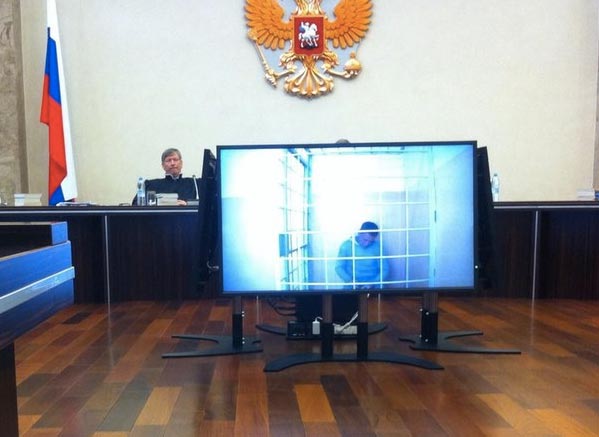
The Sadovaya Prison Colony is technically classified as a “settlement colony,” a step below a labor camp. But the only real difference is that prisoners don’t have to wear uniforms and have more telephone access, according to Mitrenko of the Public Monitoring Commission. There are still regular beatings, hazing instigated by guards, and excessive hours of backbreaking work. (Four months into his detention, Vitishko filed court documents describing these abuses. When prison officials got wind, they threw him in solitary for three weeks.)
The lights are out when we reach the barracks where Olga hands me over to a team of guards. They shove me though one dark cage after another as they fuss with their jangling keys. One final slam and I am in a dim visitation cell with a wide table. Vitishko sits in the far corner.
Everything he’s been through—the beatings he’s suffered, his stints in solitary—is not reflected in his face. He is still the same quick-witted switch of a man I met before the Olympics in Tuapse. And ever the troublemaker, he’s fresh from a victory against the prison administration: He recently discovered that the two telephones he and his 800 bunkmates were squabbling over, often violently, were grossly insufficient under the Russian penal code. He wrote a motion that his attorney helped file, and, just a few days ago, the prison had installed 98 more.
I ask him what he thinks about being named Russia’s ecological “prisoner of conscience” by advocacy groups like Human Rights Watch and Amnesty International.
Vitishko is not comfortable with it: For one, he feels the groups are getting a lot of mileage out of his case without doing anything to help. “Postcard drives only accomplish so much,” he says. “I’m a good advertisement, but not a good investment.” Mostly, though, he says it feels ill conceived to single him out: Many of his fellow inmates are also in here for the wrong reasons. Thanks to corrupt judges, prosecutors, and police, in Russia a guilty verdict is almost inevitable once a defendant is charged. According to government statistics, the chance of acquittal is less than 1 percent.
“They’re here because they did something,” Vitishko says of his fellow inmates. “But whether that something warrants prison isn’t always clear.”
Vitishko describes his mind-numbing prison routine: In the spring and summer, prisoners work the farm that grows cabbage and beets. As fall and winter close in, inmates move to sweatshops, where they sew police uniforms, produce sheet metal for furniture, and assemble souvenirs. If you pick up a matryoshka doll before taking off from a Moscow airport, there’s a chance Vitishko or one of his fellow inmates made it.
In the face of grinding repetition, Vitishko worries he’s losing some of his activist energy. “We end up in these jails, inside these walls, because of our optimism,” he says. “But the temptation to become a cynic in prison is too strong.”
Before his imprisonment, Vitishko says he had hoped his report would have an impact. Instead, what he warned of has come to pass: Before the games even ended, officials announced plans to spend another $7 billion to shore up already crumbling Olympic structures through 2016. Sochi National Park is covered in construction debris dumped by subcontractors of Olympstroi, the Kremlin-formed company that built Sochi’s iconic stadiums. The village of Akhshtyr, in whose quarry Russian Railways dumped toxic waste while building a high-speed train for Olympic fans, still has no running water. The 160 or so people who live there collect rainwater to drink and bathe.
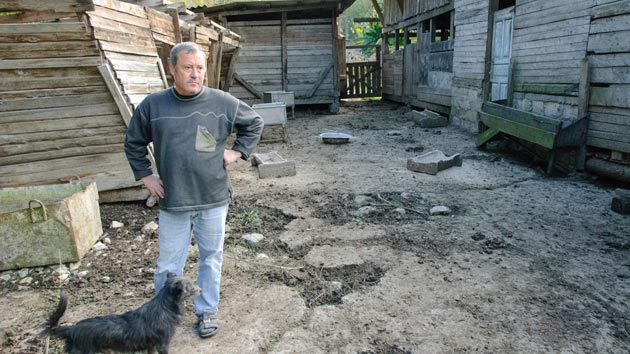
“[The Olympic venues] they have built by the sea are already sinking into the [Imereti] wetlands,” he says. “The shocking expenditures have not ended. When they do, it will all be condemned as toxic junk. But by then it will be too late to save anything—the river, the wetlands, the water supply. It’s all poisoned, the forests doomed to become landfills.”
He says he’s been thinking about what he wants to do when he gets out. He would like to see the Black Sea area restored to what it once was, a natural wonder accessible to all of Russia’s citizens. “The Olympics turned Sochi into a playground that only the few can afford, which was paid for by the many who can’t,” says Vitishko. Beyond that, Vitishko says clean water must be restored, unsafe venues razed, and an audit conducted to determine whether the Sochi resort community can ever be economically sustainable.
But he might not have many allies to return to: Gazaryan is in Germany, and in March a government lawsuit pushing to dissolve EWNC is due to be heard before Russia’s Supreme Court. Many others associated with EWNC have drifted away for fear of official reprisals like Vitishko’s, or worse.
The broader environmental movement in Russia has grown sickly under Putin. Alexey Yablokov, a biologist at the Russian Academy of Sciences and the grandfather of Russian environmentalism, tells me in Moscow that by his tally, 96 percent of Russia’s air is unhealthy to breathe due to industrial emissions. Cases of illegal nuclear waste dumping number in the tens of thousands, and Russia is happy to accept radioactive waste from other nations—like France or Germany—to pile on top of its own, much of which deteriorates in the open air. Government bodies dedicated to environmental oversight, like the Ministry of the Environment and Nature Protection, have been gutted or dismantled.
“This is no accident,” Yablokov says. “It’s a long-brewing, barely observable Putin-run policy of de-ecologization that’s hell bent on creating wealth by ravaging the environment.”
From prison, Vitishko wonders if he might best serve Russia’s fading environmental movement by advising from outside of it: “I’d like to go back to my old life and study rocks. Not demonstrations, but study,” he says.
“After all,” he adds, with a wink. “What is geology in its simplest terms but the study of slow, almost imperceptible shifts?”
Charles Digges is the editor of Bellona’s environmental and human rights news site, which published a previous version of this story. The Oslo-based foundation’s advocacy wing has been involved in campaigns to free Vitishko and pressure the Olympics to give greater weight to environmental concerns.
